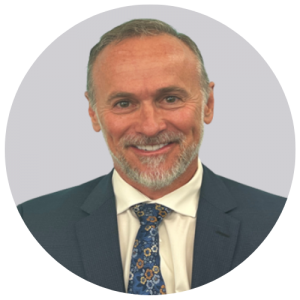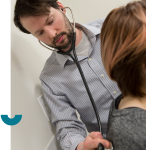Share
Medical Matters: Embracing change
Back to MessengerA behind-the-scenes look at our team’s work to create an ideal state for physician health monitoring
By Dr. Charl Els, Assistant Registrar, Continuing Competence
Read time: 4 minutes
Mental disorders, including substance use disorders (i.e., substance abuse and dependence) are expressed among individuals within most age, economic, cultural, gender and occupational groupings (Kunyk et al, 2012). Health professionals are no exception. Individuals in the so-called “pedestal professions” are also potentially vulnerable to developing health conditions that may impact all aspects of life, including work capacity and risk. Healthcare and other professionals may be affected regardless of their competence, including any special knowledge, skills or insights they may have due to their specialized education and professional experience. Some studies suggest that healthcare professionals may even be at increased risk for developing some of these disorders because of work-related factors, such as stress, shift work and fatigue because of long work hours, relative ease of access to addictive medications (e.g., opioids, benzodiazepines), self-medication of pain and emotional distress, working within certain specialties (e.g., psychiatry, anesthesiology, emergency care, etc.), and knowledge of the specific effects of medications. Other contributory factors include genetic load, adverse childhood experiences, unresolved losses, trauma, and personality variables (e.g., perfectionism and sensation seeking as a personality feature). Mental health and addiction disorders commonly co-occur, and when expressed in the professional, the delivery of safe, competent, compassionate and ethical care is foreseeably threatened. The health of the professional is also at material risk as some of these disorders may over time progress in severity, potentially resulting in prolonged disability and premature death.
Before joining CPSA, I was in a full-time occupational psychiatry practice, where I assessed the workability of employees and other workers in safety-sensitive positions. Many of the examinees were physicians, lawyers, and nurses, and the experience taught me how important early identification, valid assessment, recommendations for evidence-based care, and “right-touch” regulatory involvement are. I frequently observed that, despite their expert knowledge and the best of intentions in delivery of care, health professionals are often at a loss when trying to overcome denial of suffering from a mental health condition and/or addiction, and of mobilizing the appropriate care for themselves. As a group, physicians tend to avoid seeking help and, despite vast technical knowledge, they often self-stigmatize and underestimate the severity and impact of mental illness and/or addiction in their own lives. The result is a high degree of underreporting and a vast treatment gap for mental illness and addiction in physicians. This foreseeably translates into a potential for lower quality of care and a direct risk to the public. With this appreciation, I entered my first role as a Senior Medical Advisor in CPSA’s Physician Health Monitoring Program (PHMP). This has been an in-house program at CPSA for the past approximately 30 years, delivering support to regulated members with health conditions.
With the advent of Alberta’s Bill 46, the Health Statutes Amendment Act (2020), CPSA took a closer look at all domains of PHMP to determine if all continue to align with the legislation. We identified some opportunities for greater alignment, accompanied by a sense of urgency in that the status quo was no longer permissible under legislation. Building on earlier successes and existing strengths within the program, we assembled a team to lead the project whereby the monitoring of regulated members would be divested to independent and experienced third parties. We recognized an additional opportunity to refresh the overarching approach to achieve greater fidelity to best practice guidelines (FSPHP, ACOEM) for physician health programs and workability, as well as with industry standards for other safety-sensitive occupations. The existing standard of practice that requires regulated members to self-report to CPSA if there exists any current physical, cognitive, mental and/or emotional condition(s) that negatively impacts, or is likely to negatively impact, their work remains unchanged. Similarly, a regulated member must notify CPSA when there exist reasonable grounds to believe another regulated health professional of any college suffers from a condition that may impact workability.
Appreciating the urgency for change under Bill 46, and the complexity and potential impact physician impairment may have on the safety of Albertans, we embarked on a journey of transforming the Physician Health Monitoring Program. A first step was to create a unifying vision, or a “picture” of what a new program would look like. The aim was further to increase the appeal to all partners, which continues to be challenging given the diversity of interests of parties involved. Another focus was to ensure feasibility, and some of the earlier decisions in what is still an ongoing project had to be made despite facing uncertainty. An important lesson was that flexibility is paramount and the team’s capacity for malleability was exercised like never before. We’ve started experiencing early successes, which help fuel the next stages of the project. Another key learning reminder for me was the absolute and indispensable value of having a strong team where members enjoy mutual trust and respect.
The project has been (and continues to be) tremendously edifying and continues to provide opportunities for learning and growth in our team. I’m reminded that it’s an impossible task to make everyone happy all the time, especially when working with partners who represent different interests; however, with a common end goal and when properly understood, as remains our aspiration, the different perspectives can be a force for good. I cannot recall any other time in my career I have been challenged as I am now. Painful as change can be, I am also very aware of the “gifts” that challenges and adversity bring. There is a deep sense of satisfaction and gratitude that we’re part of something bigger than ourselves (i.e., a transformational project that would bring CPSA in alignment with the pertinent legislation, and one that will align ourselves with the highest attainable standards in the regulatory practice of physician monitoring). This, in service of all Albertans.
Challenges notwithstanding, I am optimistic that our destination is an evidence-based and ideal (or as close as we can attain) state for physician health monitoring. Embracing change is part of leadership development. I am reminded that change is a constant and inescapable part of being human and by extension, it is an innate part of life within an organization. It brings opportunities for new paths, connectedness and meaning. My thanks to each member of the team for their courageous steps along this path. My thanks to our regulated members, as well, for their patience and understanding in this time of transition. Our team is committed to ensuring all regulated members are notified as the program continues to evolve and new information is made available. I look forward to the full actualization of this new dispensation and its full integration of PHMP into continuing competence, to the benefit of all Albertans.
 |
Dr. Charl Els joined the CPSA team in 2021 as a Senior Medical Advisor and has since moved into the role of Assistant Registrar, Continuing Competence. He is an addiction psychiatrist and occupational physician, and the recipient of a QE II Platinum Jubilee award for his contribution to mental health and addiction in Alberta. |
























Terrific!